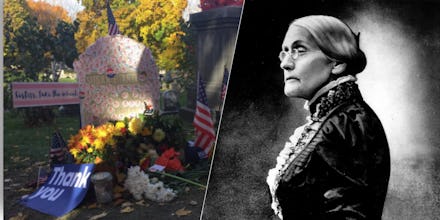Before you put an "I Voted" sticker on Susan B. Anthony's grave, remember she was a racist

Were she alive today, Susan B. Anthony would likely be downright jazzed at the prospect of Hillary Clinton entering the White House — in part because Clinton would be our first female president, and Anthony championed women's right to vote. She fought hard for women's suffrage, but died without ever having legally cast a ballot: Anthony's death in 1906 preceded the passage of the 19th amendment by 14 years.
But let us not forget: Seeing Clinton elected president would probably be a satisfying treat for Anthony, in no small part because Clinton is a white woman.
As Anthony's name trends on Twitter — and as people who proudly cast their ballots for Clinton blanket her Rochester, New York, grave in "I Voted" stickers — it's worth remembering that Anthony's legacy is, as racial activist Leslie Mac tweeted, a paragon of white feminism. Anthony's pursuit of women's rights came with a hefty dose of racism.
Anthony's movement was a hell of a lot friendlier to white women than it was to black women — or black men, for that matter.
Anthony joined the American Anti-Slavery Society in 1856. Although she was an abolitionist and a one-time friend of Frederick Douglass, as the Root pointed out, she stood firmly against the passage of the 15th amendment, which granted black men the right to vote after the Civil War's end.
The amendment ended up splitting the women's suffrage movement and ended her alliance with Douglass, who believed the right to vote was truly a matter of life and death for black men, and as such, deserved priority over women's suffrage. Anthony heartily disagreed.
"I will cut off this right arm of mine before I will ever work or demand the ballot for the Negro and not the woman," Anthony once said, as Mac noted in the course of her tweet storm.
Anthony never cut off any of her limbs, but she and fellow activist Elizabeth Cady Stanton did secede from the women's suffrage movement to form the radical National Woman Suffrage Association in 1869, which opposed the 15th amendment and, generally, the practice of putting men in leadership roles. It's worth noting that the NWSA wasn't a feminist, but more a misandrist, movement.
On its website, the National Women's History Museum is careful to emphasize that Anthony's problem wasn't with black men voting, per se. It was with black men getting the right while women — regardless of their race — were specifically denied it.
Based on Anthony's rhetoric, that doesn't ring entirely true.
Two years after the passage of the 15th amendment in 1870, Anthony was arrested for her illegal participation in the 1872 election. In a subsequent New York speech defending her decision to vote, she argued that the constitution's language applied to all people, not just white men. But then she qualified her statement — in pretty racist terms.
Anthony suggests she could live with various forms of equality — including racial inequality — so long as women enjoyed the same rights as men:
"An oligarchy of wealth, where the rich govern the poor; an oligarchy of learning, where the educated govern the ignorant; or even an oligarchy of race, where the Saxon rules the African, might be endured; but this oligarchy of sex, which makes father, brothers, husband, sons, the oligarchs over the mother and sisters, the wife and daughters of every household; which ordains all men sovereigns, all women subjects, carries dissension, discord and rebellion into every home of the nation."
Anthony's opposition to the 15th amendment seems to have been motivated, at least in part, by racial indignation: That she, a white woman, might be considered less a person than a black man. The Root cites an excerpt from an article in the Revolution, a paper Anthony and Stanton launched with the help of wealthy politician George Francis Train, who — incidentally — supported slavery, even as he did not support the confederacy. In an article from February 1869, the women wrote:
The old anti slavery school says women must stand back and wait until the negroes shall be recognized. But we say, if you will not give the whole loaf of suffrage to the entire people, give it to the most intelligent first. If intelligence, justice, and morality are to have precedence in the government, let the question of the woman be brought up first and that of the negro last.
If she wasn't opposed, outright, to the concept of voting rights for African-Americans, she advocated for a gradualism that would appear to have its roots in the belief that white people were naturally superior to, more intelligent than, black people.
And that is pretty damn racist.
On what is quite possibly the eve of Clinton's election, it's worth celebrating the progress the United States has made in the hundred-plus years since Anthony's death. Not only have we elected a black man to the presidency, but a woman might just succeed him. Race and gender continue to hold back broad swathes of the country's population, and the hope is that expanding the definition of who can be president helps expand opportunity.
But if we're putting stickers on the graves of people who helped us get here, there are a few more cemeteries worth visiting on Nov. 8. Mac offered some thoughts on that score — maybe think about Sojourner Truth, or Frances Harper, or Nannie Helen Burroughs:
Writer and editor Evette Dionne agrees. In a separate string of tweets, she laid out the final resting places of a number of black women — Ida B. Wells, Shirley Chisholm, Fannie Lou Hamer, Dorothy Height — who worked toward racial and women's equality. Having broken ground themselves, they would probably be equally enthused at the prospect of a woman entering the White House.
Save your sticker — dedicate your vote to them.